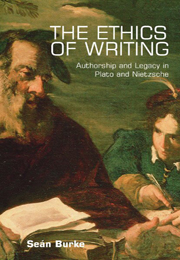Book contents
- Frontmatter
- Contents
- Acknowledgements
- Key to References and Abbreviations
- Prologue: Friedrich Nietzsche in Auschwitz, or the Posthumous Return of the Author
- Introduction: The Responsibilities of the Writer
- Chapter 1 The Ethical Opening
- Chapter 2 The Ethics of Legacy
- Chapter 3 Signature and Authorship in the Phaedrus
- Chapter 4 The Textual Estate: Nietzsche and Authorial Responsibility
- Conclusion: Creativity versus Containment: The Aesthetic Defence
- Bibliography
- Index
Chapter 1 - The Ethical Opening
Published online by Cambridge University Press: 12 September 2012
- Frontmatter
- Contents
- Acknowledgements
- Key to References and Abbreviations
- Prologue: Friedrich Nietzsche in Auschwitz, or the Posthumous Return of the Author
- Introduction: The Responsibilities of the Writer
- Chapter 1 The Ethical Opening
- Chapter 2 The Ethics of Legacy
- Chapter 3 Signature and Authorship in the Phaedrus
- Chapter 4 The Textual Estate: Nietzsche and Authorial Responsibility
- Conclusion: Creativity versus Containment: The Aesthetic Defence
- Bibliography
- Index
Summary
Farewell and believe. Read this letter now at once many times and burn it. So much for these matters.
(Second Letter, 314c)DOCUMENT INSERT: 12/21/59. Field Report: Pete Bondurant Kemper Boyd, ‘For Forwarding to John Stanton.’ Marked: KB – BE CAREFUL HOW YOU TRANSMIT THIS. KB, Sorry this report Stanton wanted is late. I don't like writing things down, so cross out what you want and get it to him. Make sure Stanton destroys it.
(James Ellroy, American Tabloid)SPEECH AND WRITING: THE APORIA
The anxieties expressed in this double exergue are those of a writing construed in the simple sense of ‘sensitive’ information intended for dissemination to a very small circle of hand-picked initiates. This pairing is partly intended to show how little has changed in this regard in the twenty-five centuries that have elapsed since the cultural assimilation of writing in Socratic Greece. Written in the 1990s, James Ellroy's American Tabloid is a factional account of the covert operations that surrounded the assassination of John F. Kennedy. This time span – 1959 to November 1963 – saw the composition and publication of Totalité et Infini, and the ‘completion’ of Derrida's monumental review essay ‘Violence et métaphysique: Essai sur la pensée d'Emmanuel Levinas’ – a response which in its perspicuity, detail and length is both unprecedented in the history of written discourse and raises the genres of both ‘essay’ and ‘review’ to an inconceivable, literally vertiginous height – for publication in two consecutive 1964 issues of the Revue de métaphysique et moral.
- Type
- Chapter
- Information
- The Ethics of WritingAuthorship and Legacy in Plato and Nietzsche, pp. 46 - 104Publisher: Edinburgh University PressPrint publication year: 2008



